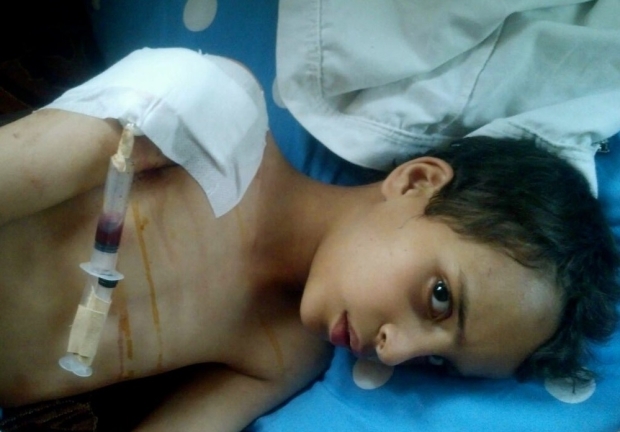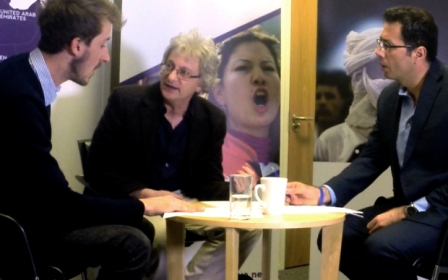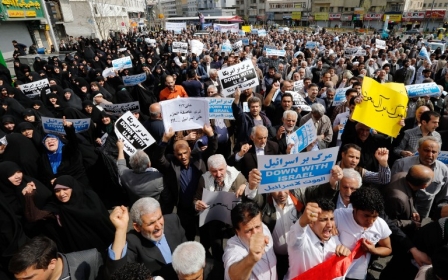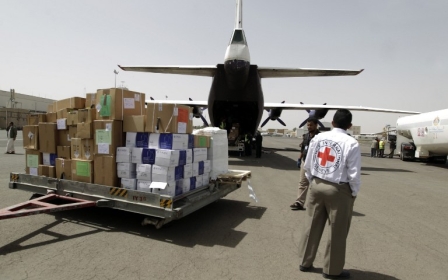Children the main victims of Yemen’s war as fighting intensifies
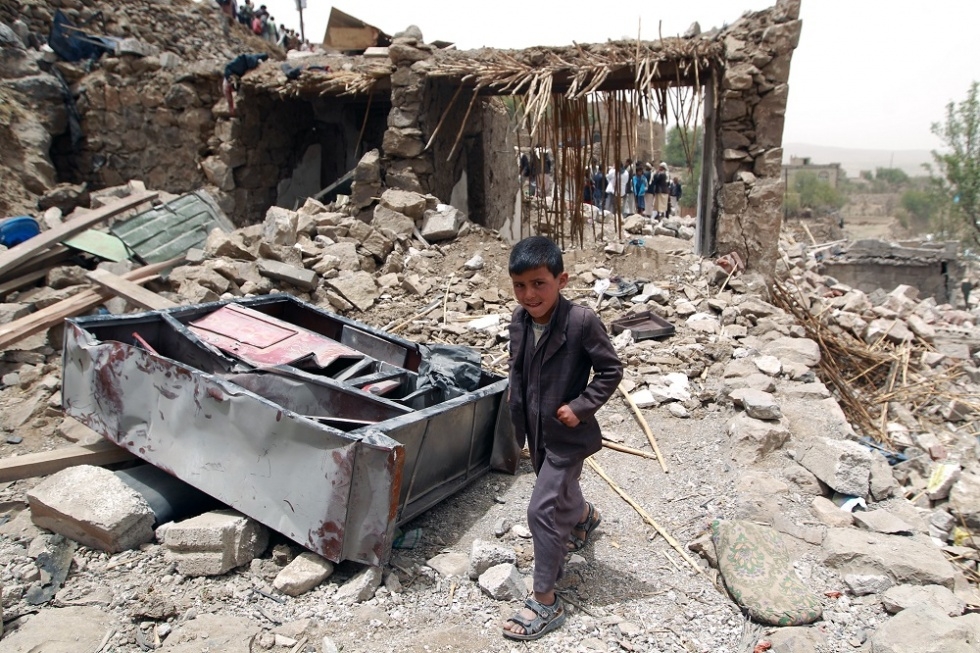
SANAA: After a brief respite from Saudi-led airstrikes against Houthi militias in the Yemeni capital of Sanaa, 10 children ventured out to play football in al-Qasr Street, next to the Republican Palace.
Before long, a cluster bomb struck and shrapnel from the explosion hit the youngsters. Mostly it pierced through their legs and feet, but three suffered severe head and spinal injuries.
Faiza Ahmed Mashoora, 30, an eyewitness to the attack who lives in the area, described the incident as “unprecedented”.
The children were aged between eight and 13. They were losing blood fast and were immediately rushed to the state-run Republican hospital, where Yehyia Al Hadi, an orthopaedic doctor, said the three children were in “a critical condition and might not survive”.
Due to a lack of adequate medical supplies and staff support, the doctor wanted to transfer the children to another hospital, al-Thawra, or to private hospitals such as one at the University of Science and Technology or the Saudi-German Hospital, for immediate care.
This was on Tuesday. As of Saturday, the three boys are all still believed to be in intensive care. One of the boys' uncles, Saleh Abd Rahman, said his nephew had been transferred for treatment as he was the most critical, but that it took quite some time to transfer the other two boys. All three have now been patched up but are awaiting much-needed specialist surgery.
In the present crisis, that is unlikely to become available. Even during peace time, people requiring complex operations often travelled abroad to places like Jordan or the UAE. The longer the fighting goes on, the smaller the youngsters’ chances are likely to be.
Stories like these have become all too common in Yemen since the start of the Saudi-led military campaign against the Houthi militias three weeks ago.
One now sees children, bleeding wounds staunched by tourniquets, lining the wards waiting for their turn to be attended. Parents and fellow patients who wait their own turn repeatedly cry out things like: “Why our children? What did they do? They were just outside playing.”
Ahmad Taha’s son is one of the many children who have been badly injured in recent weeks. When he took his son to the hospital, he was forced to wait for hours. The severity of his son’s injuries appeared to have little impact on the waiting time.
“I brought my child here so they would stop his bleeding and attend to him. But since we got here, his condition has worsened,” he told Middle East Eye.
Eventually, doctors amputated his eight-year-old’s hand, the distraught father said.
The situation is so bad that the father complains that people are not just scared of the bombs or the fighting. “Another killer are the hospitals themselves. The doctors aren’t doing anything once the patients are brought here,” he said.
Even as Taha’s son was finally being seen, scores of other parents with injured children were scrambling for attention. They would regularly shout for help but to no avail. As loud as they yelled, their cries were muffled by the shrieks of the children, many of whom were in clear pain.
Helpless doctors scurried around looking for anaesthetics, medicine or surgical kits to attend to the little ones, but in vain.
Dr al-Hadi said he was short of basic life-saving medicines and medical expertise. “Hospitals have neither the money nor the influence to secure the required medical and timely help,” he told MEE. “How are we supposed to treat our patients?”
Sitara Jabeen, spokesperson for the Middle East International Committee of the Red Cross (ICRC), said that for weeks there had been several obstacles to securing the right clearances to deliver 48 tonnes of medical supplies.
On Saturday, however, the first aid planes managed to land in the capital, bringing 16.4 tonnes of medicines, bandages, intravenous fluids and surgical equipment to Sanaa and a four-member surgical team was on its way to the southern port city of Aden.
Yet it is unlikely that the trickle of aid will be able to plug the wider humanitarian need.
“It’s a mess. There is a shortage of doctors, while the hospital wards are overflowing with civilian casualties,” Taha said. “People have lost their homes and their possessions and are now losing their loved ones.”
The World Health Organisation reports that at least 643 people have been killed since the 26 March start of the Saudi-led military campaign against the Houthis, and more than 2,200 have been injured. The United Nations Children’s Fund (UNICEF), said that at least 74 of those killed were children.
Fuel prices up, Yemeni rial falls
The families and loved ones of those injured are not the only ones being hit by the crisis. The capital Sanaa is also suffering from an array of other shortages.
For days, drivers have been lining up near Hadda Street, converging at the important al Misbahi roundabout, to obtain fuel. The line is some three-miles long and shows no sign of dissipating.
After three days in a queue earlier this week, a delighted Suhail Shaman, 27, chewing the mild narcotic qat, grinned as he made it to the front. “Alhamdulillah [thanks be to God], I can go home now,” he said, after topping his tank to the maximum limit of 40 litres for 6,000 Yemeni rial (US$28, or $0.70 a litre).
Oxfam has said diesel prices have now shot up to $2.80 per litre due to the escalating violence and a shortage of supply. The local value of the rial against the US dollar is also sliding, touching 226 to the dollar compared to an official rate of around 215. Analysts warn it could go drop further if the Saudi-led coalition strikes don’t cease or the Houthis don’t put down their arms.
When architect Mohammed al-Qassimi tried to withdraw dollars for work reasons, his bank wouldn’t allow him.
“Soon after the start of the airstrikes, people flocked to the banks to withdraw dollars. Central Bank of Yemen gave orders to the banks not to deal in dollars,” Qassimi said.
Those with any form of savings are now extremely concerned that whatever financial cushion they may have had could be wiped out. The rising price of sending money abroad is only further fanning panic.
“Instead of the standard $7 per $1,000, I had to pay $15. We are being squeezed from all sides,” said Amal Alnesi, who had to send money urgently to her ill mother, who is undergoing chemotherapy treatment in Jordan.
Food scarcity, local business hit
Prior to the conflict, more than 10 million Yemenis, close to half the country’s population, didn't know where their next meal was coming from. The violence is sure to exasperate that further.
Even in the capital, food shortages are widespread in the souqs, or markets, across Old Sanaa, particularly for wheat, rice and sugar.
Amar Ali Yehyia, who lives in the old quarter with a family of eight, said that in a few weeks he will run out of wheat and rice at home. “I am not sure what to do,” he said.
He said wealthy people are stocking up on non-perishable items such as sugar, rice, wheat and oil, as prices are only expected to go up as availability begins to plummet.
Businesses have also taken a severe hit. Mohammed al-Hammedi’s meat shop in Old Sanaa has not sold more than two to five chickens a day in the past week. His outgoings for feeding and looking after the animals are the same. “Before I used to sell 15 to 20 kilos of meat every day. On Fridays, people eat chicken, but the business is not like before.
“Customers who would buy meat on credit and repay later are holding back from making a purchase because a majority of the people are unemployed. They are being careful,” he told MEE.
Meanwhile in Aden, the internecine warfare between the Houthi militia, backed by former president Ali Abdullah Saleh and supporters of his son, and his presidential successor - Abd Rabbuh Mansur Hadi, who fled Yemen to Saudi Arabia - has intensified.
Many residents have been left without access to electricity or clean drinking water for more than five days, sparking widespread concerns amongst international aid groups that the situation is likely to spiral further.
Bilal Gulamhussein, a historian and writer based in the southern port city, said the water they were using was contaminated and the children were starting to fall ill.
The lack of rubbish collection has only further degraded the situation. “The rubbish has not been picked up for days, it’s infested with flies and mosquitoes, and dead bodies are lying in the street,” he told MEE by phone.
A despondent Hamedi, the food seller, says he is hanging on to every bit of hope that the airstrikes will soon stop and that all the parties will return to the negotiating table.
But he is far from optimistic. The US has announced that it had bolstered its support for Saudi Arabia by expediting an arms shipment and had increased intelligence operations on the ground.
“I’ve heard the reports and am unconvinced the end will be near anytime soon,” he said.
New MEE newsletter: Jerusalem Dispatch
Sign up to get the latest insights and analysis on Israel-Palestine, alongside Turkey Unpacked and other MEE newsletters
Middle East Eye delivers independent and unrivalled coverage and analysis of the Middle East, North Africa and beyond. To learn more about republishing this content and the associated fees, please fill out this form. More about MEE can be found here.


